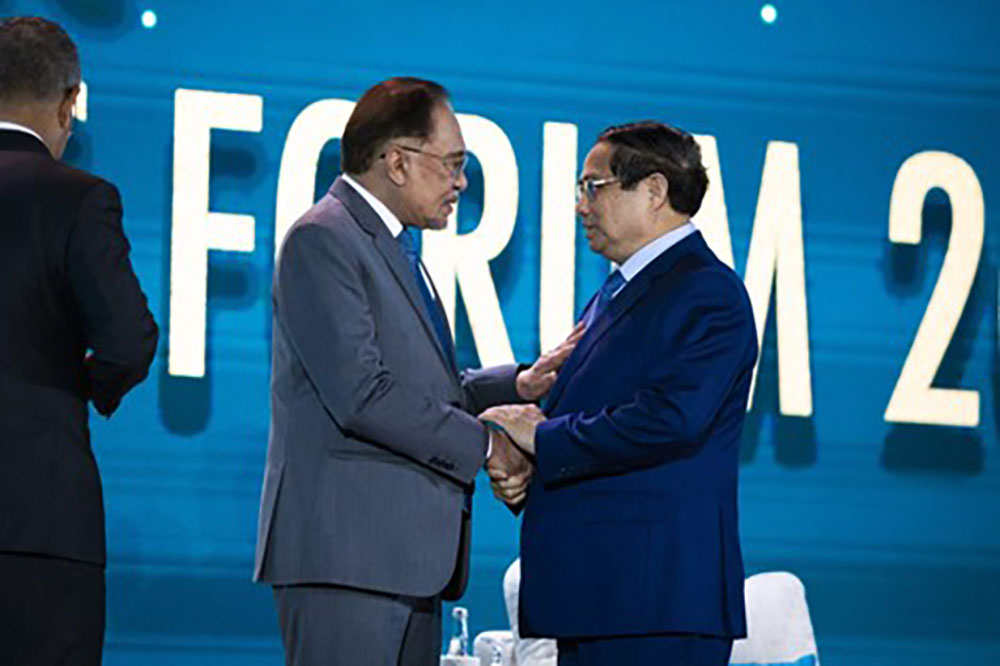
馬來西亞總理和越南總理近日表示,他們最關(guān)心的問題是人工智能帶來的風(fēng)險(xiǎn)——包括AI缺乏價(jià)值觀的問題,,它對就業(yè)的威脅問題,,以及它對國家主權(quán)的威脅,等等,。
本周三,,馬來西亞總理安瓦爾?易卜拉欣和越南總理范明政出席了《財(cái)富》雜志在吉隆坡舉辦的“東盟-海合會經(jīng)濟(jì)論壇”,。論壇期間,兩位總理均表示,,兩國需要積極擁抱人工智能這一新興技術(shù),,但他們也對如何管好人工智能技術(shù)表示了擔(dān)憂。
馬來西亞和越南都是東盟成員,,也被國際社會視為“中等強(qiáng)國”,,在全球地緣政治經(jīng)濟(jì)中扮演著重要角色。當(dāng)然,,它們也得遵守中美這樣的超級大國劃定的規(guī)則,。
目前,全球有許多國家都在投資研發(fā)所謂的“主權(quán)人工智能”,,也就是根據(jù)本國語言文化量身打造的人工智能,,以避免完全依賴由中美兩國開發(fā)和訓(xùn)練的模型。
不過在本周三,,安瓦爾在講話中指出,在人工智能時(shí)代,,國家主權(quán)可能已經(jīng)是一個稍顯過時(shí)的概念了,。
安瓦爾說:“政府的存在是為了保護(hù)主權(quán),但主權(quán)這個詞出現(xiàn)的要比新技術(shù)早,?!?/p>
他提出,各國或許可以制定新的規(guī)則,,“允許AI獨(dú)立運(yùn)行,,而不必受制于單個國家的法律”。這有點(diǎn)像現(xiàn)在外國使領(lǐng)館的運(yùn)作方式(也就是享有一定的外事豁免權(quán)),。
安瓦爾探討了AI模型可能會擁有哪些價(jià)值觀,。他還問道:“人類真的能被這種新技術(shù)和機(jī)器完全支配嗎?”他也承認(rèn),,國家和政府無法取代AI,,但是可以“通過灌輸價(jià)值觀來保護(hù)我們的身份、信仰和個性”,。
越南總理范明政也參加了周三上午的研討會,,他更關(guān)注AI對經(jīng)濟(jì)有可能造成的影響。
“是人類發(fā)明了人工智能,,而不是人工智能發(fā)明了人類,。我們不能允許人工智能凌駕于人類之上,完全取代人類,,奪走我們的工作,,甚至剝奪人們的創(chuàng)造力,。”他說,。
“我們不應(yīng)該允許這樣的事發(fā)生,。”
地緣政治問題
安瓦爾還指出,,在AI領(lǐng)域,,也存在地緣政治的問題。他表示:“中國是一個重要鄰國,?!辈贿^他也強(qiáng)調(diào),美國仍然是馬來西亞的頭號投資國,,而且馬來西亞產(chǎn)的60%的電子產(chǎn)品都出口到了美國,。
他表示:“我們必須站在全球高度看待地緣政治問題,而不是單純地站在國家或區(qū)域利益角度,?!?/p>
由于美國對華實(shí)施了嚴(yán)格的芯片出口管制,安瓦爾也反復(fù)向西方和中國芯片企業(yè)強(qiáng)調(diào),,馬來西亞在這個問題是中立的,,不會選邊站隊(duì)。
近幾個月以來,,馬來西亞的芯片戰(zhàn)略受到了美國的密切審視,。上周,馬來西亞政府一位部長稱,,馬來西亞有可能允許該國使用華為芯片,,這番言論引起了特朗普政府的“芯片沙皇”大衛(wèi)·薩克斯的關(guān)注,他還將這則新聞發(fā)布在了自己的X賬號上,。(這位馬來西亞部長后來撤回了自己的表態(tài),,華為公司隨后也向《財(cái)富》證實(shí),華為未在馬來西亞銷售過任何AI芯片,。)
助力“全球南方”
在本周三的研討會上,,嘉賓們還就技術(shù)公平的問題展開了討論。
無論是發(fā)達(dá)國家還是發(fā)展中國家,,都需要更多電力來推動AI革命,。肖鵬認(rèn)為,目前全球數(shù)據(jù)中心的耗電量約為60GW,,但要全面推動社會向AI轉(zhuǎn)型,,還需要500GW的發(fā)電量。
范明政表示,在這個問題上,,發(fā)達(dá)國家有責(zé)任向“全球南方”伸出援手,。“沒有任何一個國家和任何一個人能單獨(dú)解決這一問題,?!?/p>
范明政說:“我希望那些富裕國家和發(fā)達(dá)國家能為發(fā)展中國家提供更多援助,,以促進(jìn)人工智能的發(fā)展,。只有這樣,我們才能真正實(shí)現(xiàn)普惠發(fā)展,,不讓任何一個國家掉隊(duì),。”(財(cái)富中文網(wǎng))
譯者:樸成奎
馬來西亞總理和越南總理近日表示,,他們最關(guān)心的問題是人工智能帶來的風(fēng)險(xiǎn)——包括AI缺乏價(jià)值觀的問題,,它對就業(yè)的威脅問題,以及它對國家主權(quán)的威脅,,等等,。
本周三,馬來西亞總理安瓦爾?易卜拉欣和越南總理范明政出席了《財(cái)富》雜志在吉隆坡舉辦的“東盟-海合會經(jīng)濟(jì)論壇”,。論壇期間,,兩位總理均表示,兩國需要積極擁抱人工智能這一新興技術(shù),,但他們也對如何管好人工智能技術(shù)表示了擔(dān)憂。
馬來西亞和越南都是東盟成員,,也被國際社會視為“中等強(qiáng)國”,,在全球地緣政治經(jīng)濟(jì)中扮演著重要角色。當(dāng)然,,它們也得遵守中美這樣的超級大國劃定的規(guī)則,。
目前,全球有許多國家都在投資研發(fā)所謂的“主權(quán)人工智能”,,也就是根據(jù)本國語言文化量身打造的人工智能,,以避免完全依賴由中美兩國開發(fā)和訓(xùn)練的模型。
不過在本周三,,安瓦爾在講話中指出,在人工智能時(shí)代,,國家主權(quán)可能已經(jīng)是一個稍顯過時(shí)的概念了,。
安瓦爾說:“政府的存在是為了保護(hù)主權(quán),但主權(quán)這個詞出現(xiàn)的要比新技術(shù)早,?!?/p>
他提出,,各國或許可以制定新的規(guī)則,,“允許AI獨(dú)立運(yùn)行,而不必受制于單個國家的法律”,。這有點(diǎn)像現(xiàn)在外國使領(lǐng)館的運(yùn)作方式(也就是享有一定的外事豁免權(quán))。
安瓦爾探討了AI模型可能會擁有哪些價(jià)值觀,。他還問道:“人類真的能被這種新技術(shù)和機(jī)器完全支配嗎,?”他也承認(rèn),,國家和政府無法取代AI,,但是可以“通過灌輸價(jià)值觀來保護(hù)我們的身份,、信仰和個性”,。
越南總理范明政也參加了周三上午的研討會,他更關(guān)注AI對經(jīng)濟(jì)有可能造成的影響,。
“是人類發(fā)明了人工智能,,而不是人工智能發(fā)明了人類。我們不能允許人工智能凌駕于人類之上,,完全取代人類,,奪走我們的工作,甚至剝奪人們的創(chuàng)造力,?!彼f。
“我們不應(yīng)該允許這樣的事發(fā)生,?!?/p>
地緣政治問題
安瓦爾還指出,在AI領(lǐng)域,,也存在地緣政治的問題,。他表示:“中國是一個重要鄰國?!辈贿^他也強(qiáng)調(diào),,美國仍然是馬來西亞的頭號投資國,而且馬來西亞產(chǎn)的60%的電子產(chǎn)品都出口到了美國,。
他表示:“我們必須站在全球高度看待地緣政治問題,,而不是單純地站在國家或區(qū)域利益角度。”
由于美國對華實(shí)施了嚴(yán)格的芯片出口管制,,安瓦爾也反復(fù)向西方和中國芯片企業(yè)強(qiáng)調(diào),馬來西亞在這個問題是中立的,,不會選邊站隊(duì),。
近幾個月以來,馬來西亞的芯片戰(zhàn)略受到了美國的密切審視,。上周,,馬來西亞政府一位部長稱,馬來西亞有可能允許該國使用華為芯片,,這番言論引起了特朗普政府的“芯片沙皇”大衛(wèi)·薩克斯的關(guān)注,,他還將這則新聞發(fā)布在了自己的X賬號上。(這位馬來西亞部長后來撤回了自己的表態(tài),,華為公司隨后也向《財(cái)富》證實(shí),,華為未在馬來西亞銷售過任何AI芯片。)
助力“全球南方”
在本周三的研討會上,,嘉賓們還就技術(shù)公平的問題展開了討論,。
無論是發(fā)達(dá)國家還是發(fā)展中國家,都需要更多電力來推動AI革命,。肖鵬認(rèn)為,,目前全球數(shù)據(jù)中心的耗電量約為60GW,但要全面推動社會向AI轉(zhuǎn)型,,還需要500GW的發(fā)電量,。
范明政表示,在這個問題上,,發(fā)達(dá)國家有責(zé)任向“全球南方”伸出援手,。“沒有任何一個國家和任何一個人能單獨(dú)解決這一問題,。”
范明政說:“我希望那些富裕國家和發(fā)達(dá)國家能為發(fā)展中國家提供更多援助,,以促進(jìn)人工智能的發(fā)展,。只有這樣,我們才能真正實(shí)現(xiàn)普惠發(fā)展,,不讓任何一個國家掉隊(duì),。”(財(cái)富中文網(wǎng))
譯者:樸成奎
The risks of AI–its lack of values, the possible threat to jobs, and the challenge to sovereignty–were top of mind for two Southeast Asian leaders on Wednesday.
Both Malaysia Prime Minister Anwar Ibrahim and Vietnam Prime Minister Pham Minh Chính, speaking at Fortune’s ASEAN-GCC Economic Forum in Kuala Lumpur, agreed their countries needed to embrace the new technology, but worried about how to best manage the new technology’s transformative potential.
Malaysia and Vietnam are both members of the intergovernmental Association of Southeast Asian Nations and are often considered “middle powers”: Significant countries with important roles to play in global geopolitics and economics, yet that still operate within constraints set by major powers like the U.S. and China.
Many countries are now investing in “sovereign AI,” or AI tailored to their own national language and culture, so as to avoid relying entirely on models developed and trained in the U.S. or in China.
Yet on Wednesday, Anwar suggested the idea of national sovereignty may be slightly out of date in the AI age.
“Governments are there to protect sovereignty, but the word ‘sovereignty’ actually predates new technology,” Anwar said.
He suggested countries may need new rules “that allow AI to operate independently without having to subject itself to laws of the country,” similar to how foreign embassies (with some level of protection from the sovereign government) operate today.
Anwar also spoke broadly on what values an AI model might hold. “Can human beings be dictated purely by this new technology and machines?” he asked. While he accepted that countries couldn’t replace AI, they could “protect our identity, our faith, our personality through inculcation of values.”
Chính, who joined Anwar on Wednesday morning, focused on how AI might disrupt the economy.
“People invent AI, not the other way around,” he said. “We cannot allow AI to prevail against humans, to entirely replace humans, to take away the jobs we have and rob creativity from the people.”
“That is something that we simply shall not allow,” he added.
Geopolitical tension
Anwar noted the geopolitical trickiness that comes in the AI space. “China is an important neighbor,” he said. Yet he emphasized that the U.S. remains the “number one” investor in Malaysia, and that 60% of the country’s electronics exports are bound for the U.S.
“We have to navigate [geopolitics] as a global strategy, not purely dictated by national or regional interests,” he said.
Anwar has repeatedly pitched Malaysia as “neutral territory” to both Western and Chinese chip firms, as the U.S. imposes strict controls on the sale of advanced chips and chipmaking tools to Chinese companies.
Malaysia’s place in the chip sector has come under U.S. scrutiny in recent months. Last week, a Malaysian minister’s comment that the country would deploy Huawei’s AI chips in the country caught the eye of David Sacks, the Trump administration’s “AI czar,” who posted the news on X. (The minister in question later retracted her remarks, and Huawei later confirmed to Fortune that it hadn’t sold any AI chips in Malaysia.)
Helping the Global South
The panelists on Wednesday’s discussion wrestled with the question of fairness.
And much more electricity–in both the developed and developing worlds–will be needed to power the AI revolution. Xiao estimated the world currently has about 60 gigawatts of data centers, yet suggested that as much as 500 gigawatts will be needed to fully power the shift to AI.
Yet Chính pointed out that it’s up to the developed world to extend that helping hand to the Global South. “No single country or individual can tackle this problem alone.”
“I do hope that wealthier countries, developed countries, can put in greater assistance for poorer developing countries to foster this AI growth,” he said. “Only then can we achieve truly inclusive development where no one is left behind.”






